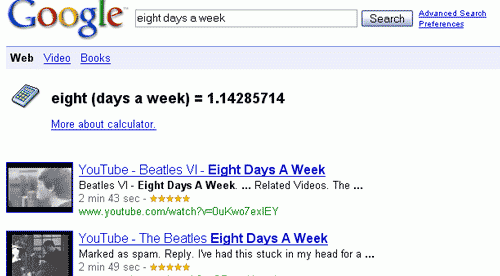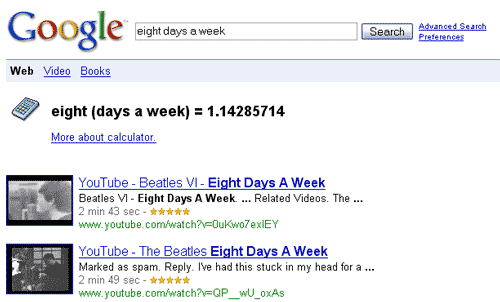Null is Void


The image above comes from a Google search circa 2008. The person performing the search is, almost certainly, looking for information about the Beatles’ song “Eight Days a Week,” a song which topped the charts shortly after its 1964 release and was an RIAA gold-certified song with over a million shipments. The person was probably not trying to figure out how many weeks eight days consists of, but Google decided to pop out its calculator feature anyway, informing the searcher that there are 1.14 or so weeks in eight days.
We can learn a couple of things from this. First, “one and fourteen-one hundredths or so weeks crammed into one week is not enough to show I care” is not a catchy lyrical phrase. And second, the result above teaches us that even really well-programmed computers like Google’s search algorithm often take inputs and, well, screw them up. When searching for a Beatles song, that’s not a big deal. But when your name is Christopher or Jennifer Null, well, it can be pretty bad.
In November of 2015, a technology writer named Christopher Null took to Wired magazine to explain his predicament. As Null pointed out, “software programs frequently use ‘null’ specifically to ensure that a data field is not empty, so it’s often rejected as input in a web form.” (Fans of the comic xkcd may find this similar to the “Bobby Tables” problem.) If you’re filling out, say, an application for a mortgage, and the web form rejects your last name, you’re kind of stuck. On the one hand, you simply can’t continue by using your real last name. On the other hand, lying to the bank about your identity is probably a big mistake.
And sometimes, the problem goes beyond the last name. Mr. Null continued:
There are some times when a workaround just isn’t possible. I’ve been embroiled in a cordial email battle with Bank of America, literally for years, over my email address, which is simply null@nullmedia.com. Using null as a mailbox name simply does not work at B of A. The system will not accept it, period. For many months I had a workaround: I created an alias—using info instead of null—and just forwarded the email sent to that alias to my regular account.
This worked for a long time, until abruptly my email stopped arriving (which resulted in a missed credit card payment). It took some digging but I discovered that in the course of upgrading its system, B of A’s system actually got worse, not better, and it stopped being able to handle the string “null” as part of my domain name, too. No email address at nullmedia.com would work any more. Ultimately I had to switch my email address altogether to a Gmail account—though oddly that has “null” in the mailbox name too, just not at the beginning.
Other Nulls have reported similar problems. Earlier this year, a woman named Jennifer Null — having assumed her husband’s last name (she wasn’t born a Null) — discovered the ill effects of her new surname first hand. As the BBC reported, “generally, the more important the website or service, the stricter controls will be on what name she enters – but that means that problems chiefly occur on systems where it really matters.” As a result, Ms. Null couldn’t book airplane tickets online (she’d have to call); the government had problems processing her and her husband’s taxes; signing up for basic utilities was a struggle; and the automated substitute teacher notification system she used to find work often skipped over her. To these computers, she didn’t exist.
Despite how obvious the problem is (in retrospect, at least), and at how many other words could fall into a similar trap, the software flaw often persists. As it turns out, it can be complicated to account for — there are a handful of online discussions featuring coders who are trying to come up with a work-around (here’s one example) and often, there’s no straightforward solution. Except for changing your last name, that is. Just don’t change it to “Void” or “No Data.”
Bonus Fact: Just like a web form needs your last name to create an account for you, the post office needs to know your address if you want them to deliver you your mail. But that’s a problem for the town of Carmel-by-the-Sea, California. As the town’s official website points out, homes do not have street numbers; “those seeking directions receive hints such as ‘fifth house on the east side of Torres Street, green trim, driftwood fence’ or by the legendary names adorning most houses, such as ‘Hansel’ or ‘Sea Urchin.'” That’s not good enough for the U.S. Postal Service (by design — the town eschewed street addresses because it didn’t want house-to-house mail delivery). In order to get your mail there? You have to go to the post office to pick it up.
From the Archives: Operator Unknown: What do you get when your license plate says “NO TAGS”? Lots of tickets. (That one could have also cited to an xkcd comic, but didn’t.)
Take the Quiz: Can you pick the celebrities whose last names might be defined by each of the following entries?
Related: “What If?: Serious Scientific Answers to Absurd Hypothetical Questions” by Randall Munroe, the author of the xkcd comics linked above. 4.6 stars on more than 2,500 reviews, so yeah, it’s a good book.
